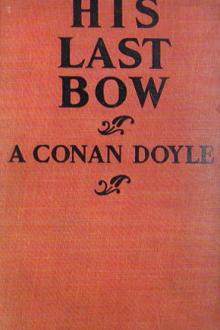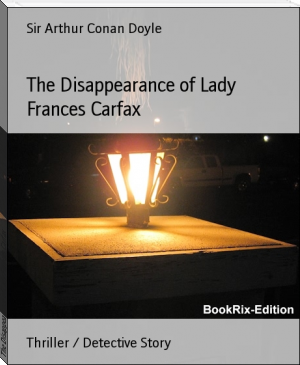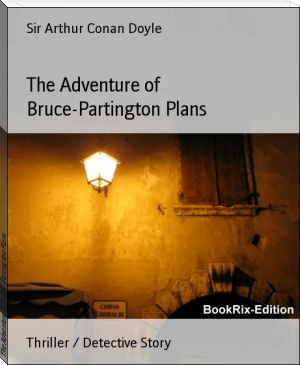His Last Bow by Arthur Conan Doyle (good books to read in english .txt) 📕

- Author: Arthur Conan Doyle
- Performer: -
Book online «His Last Bow by Arthur Conan Doyle (good books to read in english .txt) 📕». Author Arthur Conan Doyle
that we shall want no more evidence, for on being brought before
the inspector at the station he asked leave to make a statement,
which was, of course, taken down, just as he made it, by our
shorthand man. We had three copies typewritten, one of which I
enclose. The affair proves, as I always thought it would, to be
an extremely simple one, but I am obliged to you for assisting me
in my investigation. With kind regards,
“Yours very truly,
“G. Lestrade.
“Hum! The investigation really was a very simple one,” remarked
Holmes, “but I don’t think it struck him in that light when he
first called us in. However, let us see what Jim Browner has to
say for himself. This is his statement as made before Inspector
Montgomery at the Shadwell Police Station, and it has the
advantage of being verbatim.”
“‘Have I anything to say? Yes, I have a deal to say. I have to
make a clean breast of it all. You can hang me, or you can leave
me alone. I don’t care a plug which you do. I tell you I’ve not
shut an eye in sleep since I did it, and I don’t believe I ever
will again until I get past all waking. Sometimes it’s his face,
but most generally it’s hers. I’m never without one or the other
before me. He looks frowning and black-like, but she has a kind
o’ surprise upon her face. Ay, the white lamb, she might well be
surprised when she read death on a face that had seldom looked
anything but love upon her before.
“‘But it was Sarah’s fault, and may the curse of a broken man put
a blight on her and set the blood rotting in her veins! It’s not
that I want to clear myself. I know that I went back to drink,
like the beast that I was. But she would have forgiven me; she
would have stuck as close to me a rope to a block if that woman
had never darkened our door. For Sarah Cushing loved me—that’s
the root of the business—she loved me until all her love turned
to poisonous hate when she knew that I thought more of my wife’s
footmark in the mud than I did of her whole body and soul.
“‘There were three sisters altogether. The old one was just a
good woman, the second was a devil, and the third was an angel.
Sarah was thirty-three, and Mary was twenty-nine when I married.
We were just as happy as the day was long when we set up house
together, and in all Liverpool there was no better woman than my
Mary. And then we asked Sarah up for a week, and the week grew
into a month, and one thing led to another, until she was just
one of ourselves.
“‘I was blue ribbon at that time, and we were putting a little
money by, and all was as bright as a new dollar. My God, whoever
would have thought that it cold have come to this? Whoever would
have dreamed it?
“‘I used to be home for the week-ends very often, and sometimes
if the ship were held back for cargo I would have a whole week at
a time, and in this way I saw a deal of my sister-in-law, Sarah.
She was a fine tall woman, black and quick and fierce, with a
proud way of carrying her head, and a glint from her eye like a
spark from a flint. But when little Mary was there I had never a
thought of her, and that I swear as I hope for God’s mercy.
“‘It had seemed to me sometimes that she liked to be alone with
me, or to coax me out for a walk with her, but I had never
thought anything of that. But one evening my eyes were opened.
I had come up from the ship and found my wife out, but Sarah at
home. “Where’s Mary?” I asked. “Oh, she has gone to pay some
accounts.” I was impatient and paced up and down the room.
“Can’t you be happy for five minutes without Mary, Jim?” says
she. “It’s a bad compliment to me that you can’t be contented
with my society for so short a time.” “That’s all right, my
lass,” said I, putting out my hand towards her in a kindly way,
but she had it in both hers in an instant, and they burned as if
they were in a fever. I looked into her eyes and I read it all
there. There was no need for her to speak, nor for me either. I
frowned and drew my hand away. Then she stood by my side in
silence for a bit, and then put up her hand and patted me on the
shoulder. “Steady old Jim!” said she, and with a kind o’ mocking
laugh, she ran out of the room.
“‘Well, from that time Sarah hated me with her whole heart and
soul, and she is a woman who can hate, too. I was a fool to let
her go on biding with us—a besotted fool—but I never said a
word to Mary, for I knew it would grieve her. Things went on
much as before, but after a time I began to find that there was a
bit of a change in Mary herself. She had always been so trusting
and so innocent, but now she became queer and suspicious, wanting
to know where I had been and what I had been doing, and whom my
letters were from, and what I had in my pockets, and a thousand
such follies. Day by day she grew queerer and more irritable,
and we had ceaseless rows about nothing. I was fairly puzzled by
it all. Sarah avoided me now, but she and Mary were just
inseparable. I can see now how she was plotting and scheming and
poisoning my wife’s mind against me, but I was such a blind
beetle that I could not understand it at the time. Then I broke
my blue ribbon and began to drink again, but I think I should not
have done it if Mary had been the same as ever. She had some
reason to be disgusted with me now, and the gap between us began
to be wider and wider. And then this Alec Fairbairn chipped in,
and things became a thousand times blacker.
“‘It was to see Sarah that he came to my house first, but soon it
was to see us, for he was a man with winning ways, and he made
friends wherever he went. He was a dashing, swaggering chap,
smart and curled, who had seen half the world and could talk of
what he had seen. He was good company, I won’t deny it, and he
had wonderful polite ways with him for a sailor man, so that I
think there must have been a time when he knew more of the poop
than the forecastle. For a month he was in and out of my house,
and never once did it cross my mind that harm might come of his
soft, tricky ways. And then at last something made me suspect,
and from that day my peace was gone forever.
“‘It was only a little thing, too. I had come into the parlour
unexpected, and as I walked in at the door I saw a light of
welcome on my wife’s face. But as she saw who it was it faded
again, and she turned away with a look of disappointment. That
was enough for me. There was no one but Alec Fairbairn whose
step she could have mistaken for mine. If I could have seen him
then I should have killed him, for I have always been like a
madman when my temper gets loose. Mary saw the devil’s light in
my eyes, and she ran forward with her hands on my sleeve.
“Don’t, Jim, don’t!” says she. “Where’s Sarah?” I asked. “In
the kitchen,” says she. “Sarah,” says I as I went in, “this man
Fairbairn is never to darken my door again.” “Why not?” says
she. “Because I order it.” “Oh!” says she, “if my friends are
not good enough for this house, then I am not good enough for it
either.” “You can do what you like,” says I, “but if Fairbairn
shows his face here again I’ll send you one of his ears for a
keepsake.” She was frightened by my face, I think, for she never
answered a word, and the same evening she left my house.
“‘Well, I don’t know now whether it was pure devilry on the part
of this woman, or whether she thought that she could turn me
against my wife by encouraging her to misbehave. Anyway, she
took a house just two streets off and let lodgings to sailors.
Fairbairn used to stay there, and Mary would go round to have tea
with her sister and him. How often she went I don’t know, but I
followed her one day, and as I broke in at the door Fairbairn got
away over the back garden wall, like the cowardly skunk that he
was. I swore to my wife that I would kill her if I found her in
his company again, and I led her back with me, sobbing and
trembling, and as white as a piece of paper. There was no trace
of love between us any longer. I could see that she hated me and
feared me, and when the thought of it drove me to drink, then she
despised me as well.
“‘Well, Sarah found that she could not make a living in
Liverpool, so she went back, as I understand, to live with her
sister in Croydon, and things jogged on much the same as ever at
home. And then came this week and all the misery and ruin.
“‘It was in this way. We had gone on the May Day for a round
voyage of seven days, but a hogshead got loose and started one of
our plates, so that we had to put back into port for twelve
hours. I left the ship and came home, thinking what a surprise
it would be for my wife, and hoping that maybe she would be glad
to see me so soon. The thought was in my head as I turned into
my own street, and at that moment a cab passed me, and there she
was, sitting by the side of Fairbairn, the two chatting and
laughing, with never a thought for me as I stood watching them
from the footpath.
“‘I tell you, and I give you my word for it, that from that
moment I was not my own master, and it is all like a dim dream
when I look back on it. I had been drinking hard of late, and
the two things together fairly turned my brain. There’s
something throbbing in my head now, like a docker’s hammer, but
that morning I seemed to have all Niagara whizzing and buzzing in
my ears.
“‘Well, I took to my heels, and I ran after the cab. I had a
heavy oak stick in my hand, and I tell you I saw red from the
first; but as I ran I got cunning, too, and hung back a little to
see them without being seen. They pulled up soon at the railway
station. There was a good crowd round the booking-office, so I
got quite close to them without being seen. They took tickets
for New Brighton. So did I, but I got in three carriages behind
them. When we reached it they walked along the Parade, and I was
never more than





Comments (0)